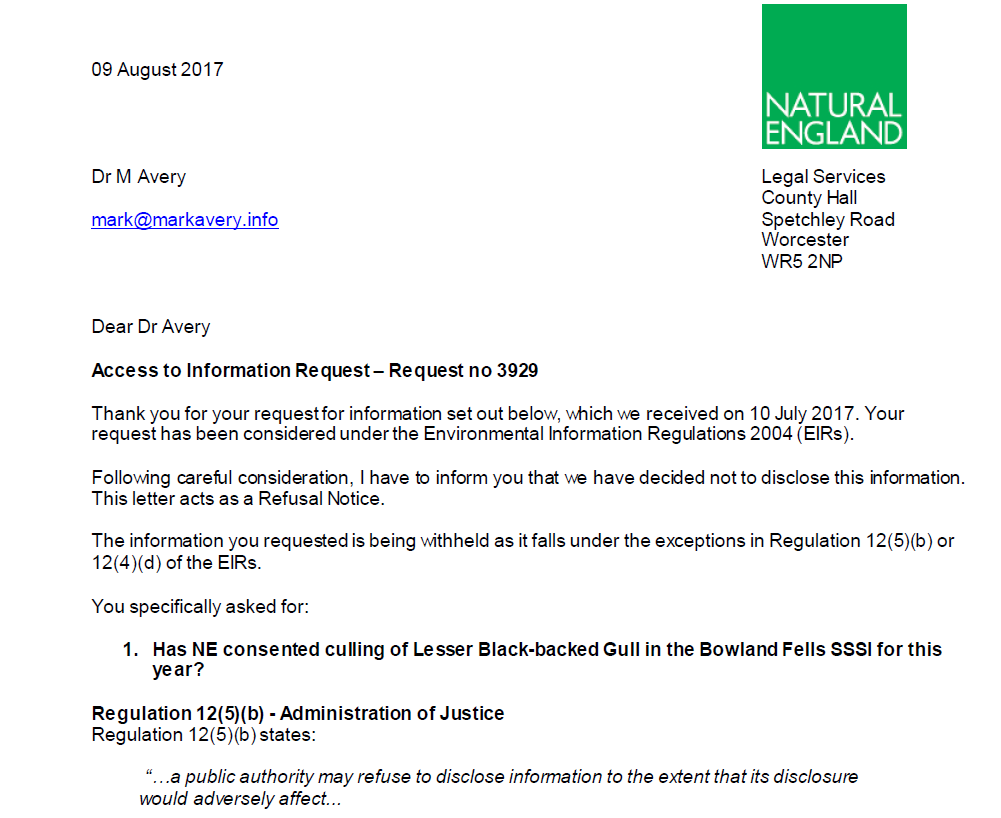
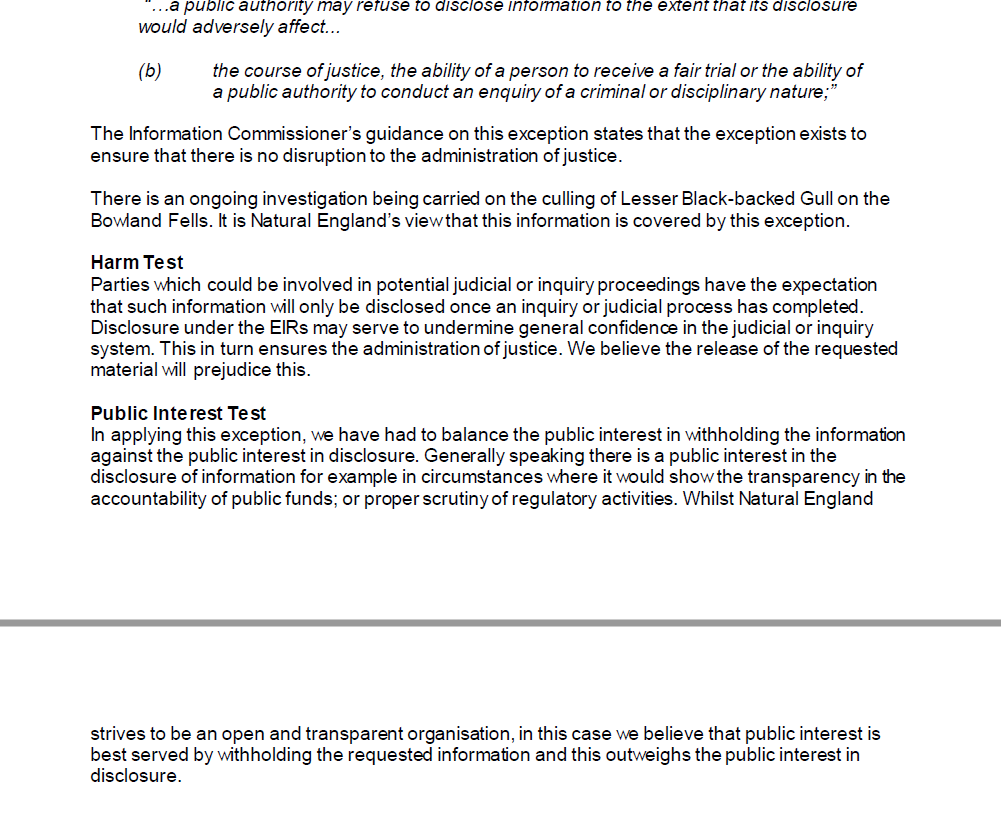
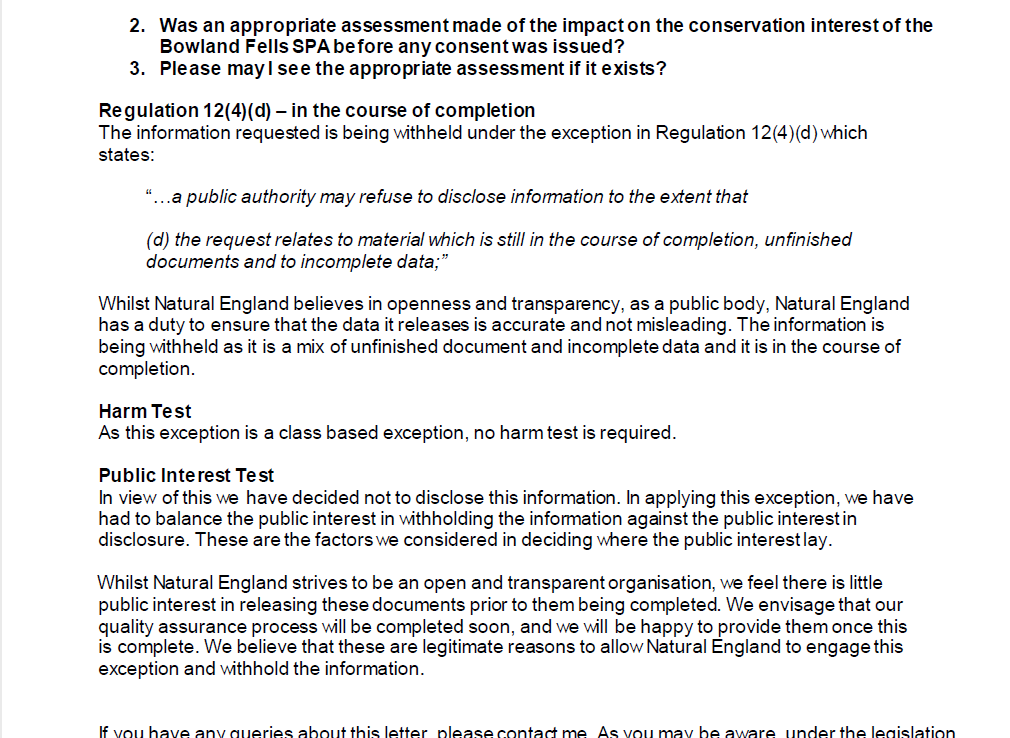
Well!
I suppose I might accept their answer to the first question – I don’t want adversely to affect the course of justice, do I? But either NE have or haven’t given a consent…
As far as the second answer is concerned (in the course of completion) – I don’t really believe it. I believe that NE has done this work.
My understanding is that NE has come to a shabby, secret deal with grouse shooters and has allocated some areas of the Bowland Fells SPA (which was partly designated for its Lesser Black-backed Gull colony, and partly for its now non-existent Hen Harrier population) as LBBG sensitive areas inside which the gulls are protected except in areas of blanket bog restoration (Eh? What’s that all about?).
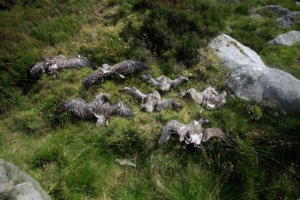 Outside of LBBG sensitive zones, NE are said to have agreed that gulls can be killed if they are predating ground-nesting birds. NE must be aware that there is research that shows that LBBGs from Bowland mostly feed away from the site eg at rubbish dumps. There may also be some NE staff remaining that can see from this photograph that juvenile gulls have been killed – and they don’t predate anything as they are fed by their parents.
Outside of LBBG sensitive zones, NE are said to have agreed that gulls can be killed if they are predating ground-nesting birds. NE must be aware that there is research that shows that LBBGs from Bowland mostly feed away from the site eg at rubbish dumps. There may also be some NE staff remaining that can see from this photograph that juvenile gulls have been killed – and they don’t predate anything as they are fed by their parents.
I think we may find out in due course that gulls have been killed inside LBBG sensitive areas and against the expressed instructions of the landowner in question.
This seems an extraordinary mash-up of nonsense by a publicly-funded statutory agency whose job it is to maintain the conservation value of SPAs, SSSIs etc etc and not to bend over backwards for the rich and powerful shooting interests who may be mates of the current government. It wouldn’t surprise me if NE isn’t struggling to dig itself out of a very big legal hole into which it may have fallen with its friends the grouse shooters. But, I might be wrong, so the sooner that NE comes clean the better.
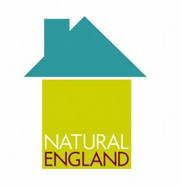
I ask again – is NE fit for purpose? And quite honestly I don’t think it is. I no longer trust NE to do the right things for nature, and I no longer trust NE to tell the truth about what it is doing.
[registration_form]
Apart from the issue, itself (i.e. why the cull was allowed (?)), this Refusal Notice says much about this country’s openness and transparency when it comes to government in general. And, of course NE, in particular.
NE hasn’t been fit for purpose for a long time. The fact they bend over backwards in accommodating the the NFU in their outrageous species eradication program that is the badger culls only serves to highlight how far they have deviated from their supposed path. But then what do you expect with a property developer at the helm?
They are nothing more than an arm of the NFU and CA, effectively legalising the killing of any protected species at the whim of those who desire it.
Seems like ‘Working for the few,not the many’. Yes Sir,No Sir,three bags full Sir !
Given that NE’s Chief Operating Officer – who has responsibilities for the agency’s strategy and reputation – is a former RSPB colleague, you might entice him to contribute to this blog…
Natural England and its various predecessors have been allowing the killing of Large Gulls( it used to contain Herring and GBBG too!) in the Abbeystead/Tarnbrook colony since the area became owned by the Westminster estates over thirty years ago. Whilst it is frankly appalling that they continue to allow this killing in an SPA for the species for completely dubious reasons it is hardly surprising given this history. Unless there are good nature conservation reasons for allowing such a cull relating specifically to the SPA itself this is of course completely and utterly unacceptable. Whilst one understands that the investigation is in relation to the conduct of the “culling” by estate employees, it is quite clear to most if not all conservationists that this licence should not have been granted in the first place. Once the investigation and any subsequent proceedings are complete NE should publish all in relation to both the licence and the incidents that led to the investigation.
Even then it is clear that all departments involved in this fiasco are NOT FIT FOR PURPOSE.
If the assessment is still to be completed how could NE issue the licence without the full facts?
If this activity was consented then an appropriate assessment should surely have been completed rather than being ‘unfinished’ as per the NE statement. If it wasn’t consented then it can only have been carried out contrary to the legislation. Either way there is an issue here and one suspects that the ‘under investigation’ get out clause will be deployed to its maximum possible extent.
Just on the point about licensing, this species is still on various general licences which means that an individual licence is not required for its control. Alarmingly, this means that away from protected sites there is nothing to stop land managers from wiping out entire colonies. As long as they say the right thing when challenged they could claim that they were acting under the general licence. It urgently needs to be removed from the general licences (along with Great Black-backed Gull), a point that has been made by NE ornithologists for many years to no avail.
Indeed, the appropriate assessment should have been undertaken first (and forms part of a Habitats Regulations Assessment is a likely significant effect cannot be excluded on the basis of scientific evidence).
I assume and hope that the RSPB will pursue Natural England through our courts and, for as long as the option is available, will submit a complaint to the EU.
Post-Brexit, there’s a huge risk (or is it a certainty?) that the option of taking our government to the European courts will disappear. I see such instances of the UK government flouting wildlife law piling up in the years to come.
This is why we need the likes of the Wildlife Trusts and the National Trust to get off their fat arses and join the RSPB, Buglife etc in ensuring that our wildlife laws are complied with.
I think that the EU should be informed that Natural England have publicly admitted that they have not complied with the directive and regulations, in the process allowing the culling of the classified species. Truly astonishing!
Surely there must be a complaints process that leads to some form of ombudsman?
NE are a failing organisation, along with their management and, sadly even some of the staff on the ground.
They are also not an open and transparent as a state body should be. Do these contentious issues get discussed at the Board meetings?
Regarding the second request, as I understand it, an Appropriate Assessment (in the context of the Habitats Regs) is undertaken by a ‘Competent Authority’ and is one of the stages of a Habitats Regulations Assessment. The Competent Authority should consult with the relevant nature conservation body (Natural England) as part of the HRA process. Who would be the CA in this case?
Your second question is a simple yes or no answer, and thus whether an AA is unfinished seems to be irrelevant!
I believe the Competent Authority is Natural England (there may be several CAs if anyone else has to issue a consent/assent).
Yes NE are the Competent Authority so under the Regulations it would be for them to explain how culling and preventing birds from breeding on certain parts of the site would not have an adverse impact on an SPA designated for that very same species. Little wonder the document is ‘unfinished’.
Ian – allegedly unfinished
This is just ludicrous. If NE has failed to conclude an AA they’re breaking European law; the UK government is open to infraction proceedings including potentially hefty fines until the situation is rectified (i.e. that, if there’s a risk of an adverse effect on integrity, alternatives and mitigation are investigated).
I’m not aware of any clause in the UK Habitats Regulations that would allow parties to cull the qualifying feature (the gulls) to protect a non-qualifying feature (other species) within a Natura 2000 site.
Natural England – you have become the worst excuse for a statutory nature conservation body imaginable.
Mark – I wonder if there’s scope to crowd-fund for someone to take some sort of formal action – Judicial Review domestically and a formal complaint to the EU? Rather than rely on (and maybe to complement) the RSPB?
Messi – they are in a mess aren’t they?
Given the high number of visitors to this blog today I wonder whether all NE staff ahve read the post and many will be sardonically smiling at the mess that the organisation is in.
What does one expect from an organisation whose senior officers come from construction (destruction of natural habitats) and financial backgrounds and whose only qualifications for the job are that they are donors to the Conservative Party.
I have discovered to the cost of my personal reputation that it is risky to criticise the national conservation agencies (or the RSPB), and as a result I’ve found my well-meaning intentions leading to being shunned to some extent. So I can fully understand why many “ordinary” ornithologists and conservationists are afraid to speak out. However this one makes me really angry, because I have always failed to understand the general prejudice against certain predatory or scavenging species, as if they are somehow second class elements of the ecosystem. Any ecologist worth his or her salt knows the essential role that is played by predators (and scavengers), and the foolishness of regarding them as automatically harmful and undesirable. Many of the beliefs about gulls and crows being unwanted members of the natural community are just as wrong as rabid gamekeepers and shooting people who feel exactly the same about harriers or foxes. Sadly this culture is deeply ingrained in our society, and leads to all sorts of unnecessary problems, cruelty and disturbance to the balance of nature. Gulls are demonised, victimised and persecuted for no naturally rational reason, and sadly some people who are otherwise “nature lovers” succumb to such views. The very idea that Natural England (or in Scotland SNH) would seriously accommodate the opinions of anyone who wants to cull these birds is plainly ridiculous, and without any basis other than acceding to a minority populist demand. The display of arrogance and bureaucracy in NE’s response to Mark Avery is almost frightening. How can NE possibly justify such a degree of obfuscation? They insult our intelligence, and it’s hard not to come to the conclusion that they’re not fit for purpose.
Just a quick comment on the culinary habits of LBBG’s: I spotted then helped to recover a dead short eared owl in Tarnbrook close to a large colony of the gulls. The gulls hadn’t spotted or were not interested in the carrion so I doubt if they would rampage through grouse nests either. Btw shortie died of natural causes.
The next action is just to ask NE for an internal review of the second answer. They are legally obliged to do that, and it might give them a chance to get their knickers at least partially untwisted.
Apparently NE have a ‘HRA Standard’ for all instances where it acts as the Competent Authority http://publications.naturalengland.org.uk/file/5658137297158144
“The HRA will clearly record the process and the justification for the judgements and decisions it makes”
In 2010 Natural England proposed continuing a 40 mph speed limit through a narrow railway tunnel in Upper Wolvercote, Oxford to preserve a rare colony of bats. Chiltern Railways refused to maintain the existing speed limit (they wanted to upgrade the line to 110 mph) even though I had calculated that maintaining the speed limit just through the tunnel would add a mere 46 seconds to the journey time to Marylebone, London (the tunnel is between and close to both Oxford and Water Eaton Parkway stations). NE refused to grant a bat licence for the necessary work, and Chiltern Railways lost the Public Inquiry.
One year later, after the Coalition Government “intervened”, Natural England REVERSED their stance, and SUPPORTED the upgrading of the railway line to 110 mph. A new Public Inquiry was called, and Natural England’s representative told me under cross-examination (I was an objector) that ‘it didn’t matter’ if the bat colony died out as a result of barotrauma or collision with fast trains. Chiltern Railways won the second Public Inquiry as a direct result.